Keynotes & Symposiums
IEEE GCCE 2014 has exciting Keynote addresses and exceptionally interesting Symposiums by distinguished researchers and business leaders. All of these special events will be held on the morning of Wednesday 8th October on the second floor of the conference hall, and are open for attendees of not only GCCE 2014 but also CEATEC.
Please come and enjoy these events, and share knowledge and hot ideas.
[Wednesday, October 8, 10:00 – 11:30]
Symposium - An Exciting Future Led by Women Engineers and Researchers
First, Japanese women engineers and researchers who are active globally in the science and engineering field will give you presentations on their hot research outcomes and recent trends of technology development. Then, they will discuss their daily difficulties and joy that are unique to women in their research and development works from their perspectives in the panel discussion style.
Part I: Keynote Session
1. [Opening Keynote] Todai Robot Project, Can an AI get Into the University of Tokyo?
"Todai Robot Project (Can a robot get into the University of Tokyo?)" was launched by National Institute of Informatics in 2011 as its AI grand challenge. It aims at re-unifying the artificial intelligence field subdivided in 1980 and afterwards, and blazing a new trail. The goal of the project is to create an AI system that answers real questions of university entrance examinations consisting of two parts, the multiple-choice style national standardized tests and the written test including short essays. In 2013, our software took the mock test of the National Center Test with more than five thousands students. The result shows that its ability is still far below the average entrants of Tokyo University. However, it is beyond the mode: it is competent to pass the entrance exams of 400 out of 800 private universities in Japan.
Dr. Noriko Arai
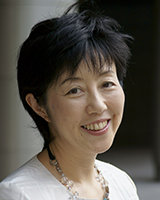
National Institute of Informatics
Dr. Noriko Arai is a Professor of Information and Society Research Division of National Institute of Informatics since 2006. She is also Director of Research Center for Community Knowledge since 2008. She received her Ph.D degree with major achievements in theory of proof complexity from Tokyo Institute of Informatics in 1997.
Her major research interests fall in the fields of mathematical logic, theory of computational and proof complexity, e-learning, knowledge sharing and artificial intelligence. Dr. Arai is known as the leader of the open source software project, NetCommons, which is used more than 3,500 schools and institutes. She won IASTED 3rd International Software Competition (2007), and was awarded NISTEP Award from National Institute of Science and Technology Policy (2009), Prizes for Science and Technology, the Commendation for Science and Technology from The Ministry of Education, Culture, Sports, Science and Technology in Japan (2010). From 2011, she has been Program Director of an AI grand challenge, Todai Robot Project (Can AI get into the University of Tokyo?). This project aims to add a new dimension to the current information technology and bring a deeper understanding of human intelligence, by setting a concrete goal: development of a software system which is able to pass university entrance exams.
2. Development of 3D display and our user experience design for improving the satisfaction level of users
This lecture will focus on the technological basis, features, and management in mass-production of the world's first commercialized glasses-free 3D television. Our key technology “Novel viewing zone control method” won the 21st Century Invention Prize by Japan Institute of Invention and Innovation in 2010. In this lecture, I will also describe the user experience design of Toshiba, which aims to improve satisfaction level of users.
Ms. Rieko Fukushima
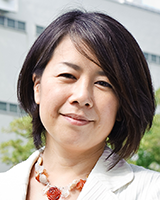
User Experience Design Research Group, Design Management Department, Design Center, Toshiba Corporation
Rieko Fukushima graduated from Department of Chemistry at Tohoku University in Japan, and received a M.S. degree from Graduate School of Science, Tohoku University. She joined Toshiba Corporation in 1995 and was involved in the development of liquid crystal display.
After returning from maternity leave in 2002, she had been engaged in and responsible for the development of the world’s first glasses-free 3D display. She was awarded Technology and Development Prize/Technology Award by The Institute of Image Information and Television Engineers in 2007, 21st Century Invention Prize by Japan Institute of Invention and Innovation in 2010, Prizes for Science and Technology by the Minister of Education, Culture, Sports, Science, and Technology in 2011, and Niwa-Takayanagi Prize by The Institute of Image information and Television Engineers also in 2011.
In 2012, she was promoted to a Chief Scientist, and from October 2012, she was also appointed as a Chief Specialist of the Design Center and has engaged in the establishment of the user experience design of Toshiba Corporation.
3. Impact and Implications of Social Media Analysis
With the rapid growth of Internet, Information and Communication Technologies various web based social networks are emerging at a fast pace. People interact with each other through on line social networks and their decision making in every sphere of life is influenced by those interactions. Efficient mining and analysis of online social media data can provide assistance to people in different social needs like crisis management, reputation analysis, customer profiling and product survey. In this lecture, some of our research works in which data mining technologies are used for online social media data analysis, are presented.
Dr. Takako Hashimoto
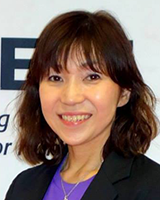
IEEE Women In Engineering
Coordinator (2011-2014)
IEEE R10 Women In Engineering
Past Chair
IEEE Japan Council Women In Engineering
Dr. Takako Hashimoto graduated from the Ochanomizu University, and received a Ph.D. in computer science, specialization in multimedia information processing, from the Graduate School of Systems and Information Engineering of University of Tsukuba in 2005. She worked at the software R&D center of Ricoh Co. Ltd., in Japan for over 20 years, and participated in the development of many software products as a technical leader including international collaborative research handling. From 2009, she has become a faculty of Chiba University of Commerce. Currently, she has focused on the data mining research and the visual instruction method development for finance engineering. From 2011, she's been serving as the IEEE Region 10 Women in Engineering (WIE) Coordinator and from 2013, she has been part of the IEEE WIE Committee as the chair of the membership/affinity group sub-committee.
In 2015, she will become the IEEE WIE Chair and her activities will be internationally diversified.
Part II: Panel Discussion with Keynote Speakers
Moderator
Dr. Miwako Doi
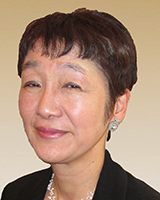
Institute of The Institute of Image Information and Television Engineers
Auditor
National Institute of Information and Communications Technology
Dr. Miwako Doi is Auditor of National Institute of Information and Communications Technology. She received her B.E. and M.E. and Ph.D. degrees in 1977, 1979 and 2002 from the Univ. of Tokyo. She joined Toshiba in 1979 and has been a researcher of human interface technology and involved in developing a portable Japanese word processor, a machine translation system, a CG chip for video games, a pedestrian navigation system for mobile phones, and so on over 35 years. She is a council member of The Science Council of Japan, a member of the Steering Committee of Tokyo Institute of Technology, a member of the Steering Committee of Japan Science and Technology Agency, the next president of The Institute of Image Information and Television Engineers and others. She got 20 prizes: the Commendation for Science and Technology by the Minister of Education, Culture, Sports, Science and Technology, Award of the Minister of Internal Affairs and Communications, the Achievement Award, and so on. She authored and co-authored 12 books, over 300 patents, over 300 technical papers on multimedia information system, human interface design, and so on.
[Wednesday, October 8, 11:45 – 13:00]
Current Status and Future Outlook of International Academic Societies
Dr. Young Shik Moon, president of IEIE (The Institute of Electronics and Information Engineers), Korea, and Dr. Miwako Doi, the President-elect of ITE (The Institute of Image Information and Television Engineers), Japan, are invited to this symposium. Mr. Stefan Mozar, President of IEEE Consumer Electronics Society, and they will introduce their academic societies to you and discuss their future outlooks.
1. The Institute of Electronics and Information Engineers (IEIE), Korea
Dr. Young Shik Moon
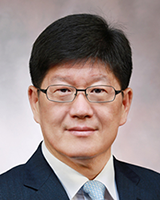
The Institute of Electronics and Information Engineers (IEIE), KR
Dean
College of Engineering, Hanyang University (ERICA Campus), KR
Professor
Dept. of Computer Science and Engineering, Hanyang University, KR
Young Shik Moon received the B.S. and M.S. degrees in electronics engineering from Seoul National University and Korea Advanced Institute of Science and Technology (KAIST), Korea, in 1980 and 1982, respectively, and Ph.D. degree in electrical and computer engineering from the University of California at Irvine, USA, in 1990. From 1982 to 1985, he had been a researcher at the Electronics and Telecommunications Research Institute, Daejon, Korea. In 1992 he joined the department of Computer Science and Engineering at Hanyang University, Korea, as an Assistant Professor, and is currently a Professor. His research interests include computer vision, image processing, pattern recognition, and computational photography.
He had been the Dean of Academic Affairs (2008-2012) and is now the Dean of College of Engineering, Hanyang University (ERICA Campus), Korea. He is also the President of the Institute of Electronics and Information Engineers (IEIE), Korea.
2. User-Oriented Innovation Triggered by Societies
Dr. Miwako Doi

Institute of The Institute of Image Information and Television Engineers
Auditor
National Institute of Information and Communications Technology
Dr. Miwako Doi is Auditor of National Institute of Information and Communications Technology. She received her B.E. and M.E. and Ph.D. degrees in 1977, 1979 and 2002 from the Univ. of Tokyo. She joined Toshiba in 1979 and has been a researcher of human interface technology and involved in developing a portable Japanese word processor, a machine translation system, a CG chip for video games, a pedestrian navigation system for mobile phones, and so on over 35 years. She is a council member of The Science Council of Japan, a member of the Steering Committee of Tokyo Institute of Technology, a member of the Steering Committee of Japan Science and Technology Agency, the next president of The Institute of Image Information and Television Engineers and others. She got 20 prizes: the Commendation for Science and Technology by the Minister of Education, Culture, Sports, Science and Technology, Award of the Minister of Internal Affairs and Communications, the Achievement Award, and so on. She authored and co-authored 12 books, over 300 patents, over 300 technical papers on multimedia information system, human interface design, and so on.
3. How the IEEE Consumer Electronics Society is adopting to changes in the Consumer Electronics Industry
Mr. Stefan Mozar
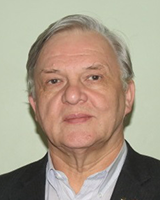
IEEE Consumer Electronics Society
CEO
Dynexsys
Adjunct Professor
Guangdong University of Technology
Stefan Mozar is currently the President of the IEEE Consumer Electronics Society. He works as an independent consultant and is an Adjunct Professor at Guangdong University of Technology (GDUT) in South China. He obtained his engineering degrees from the University of New South Wales and his MBA from the University of Technology, Sydney. He is a Fellow of the IEAust, and a Chartered Professional Engineer. He is also a senior member of the IEEE, and ASQ. Most of his experience is in consumer electronics, where he has worked for organizations such as Philips in their Singapore Video Development labs, and for Grundig and Nordmende in Germany. Currently he is a board member of the IEEE Product Safety Engineering Society. He has served on the IEEE Technical Activities Board (TAB.) He has worked on projects that have won about 30 international design awards. He also received several awards form the IEEE for his contributions.